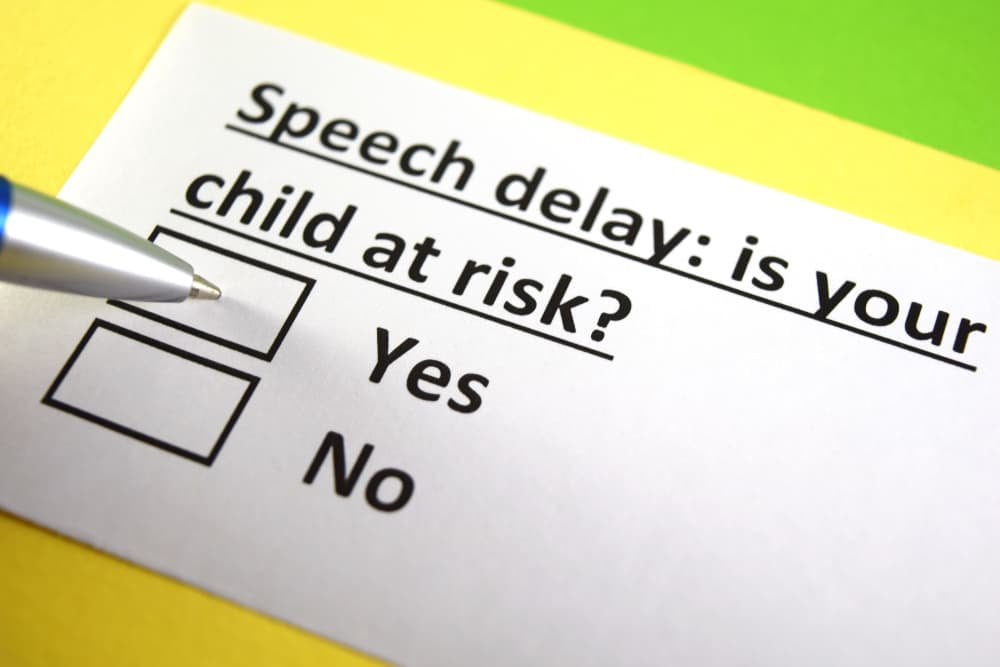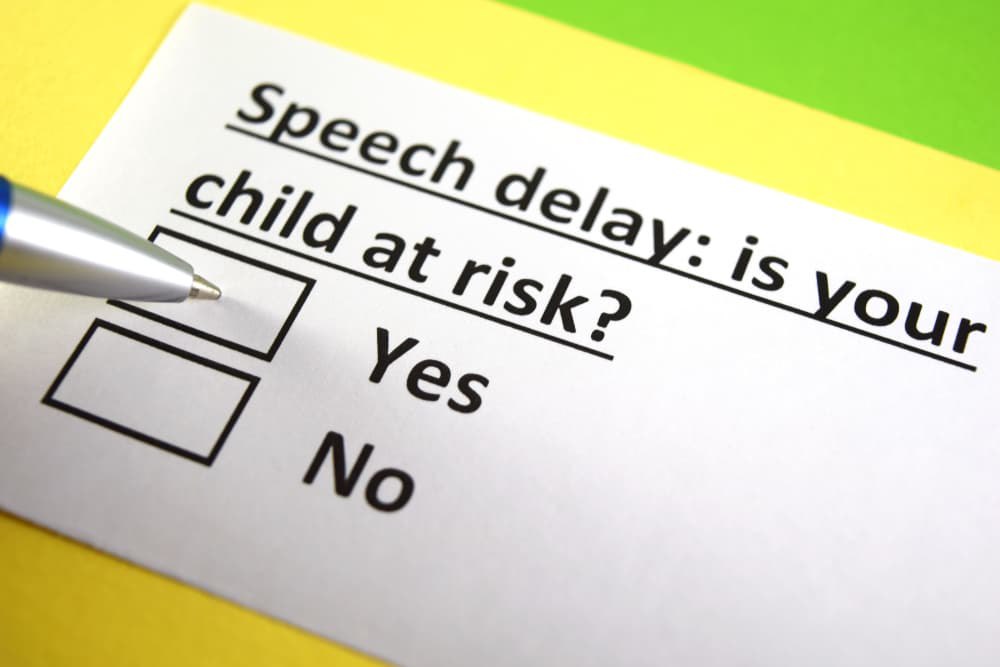Hearing Loss and Speech Delay in Children: Causes, Symptoms, and ENT Doctor
December 14th, 2022 | 4 min. read


Hearing loss and speech delay in children can be a major source of concern for parents. Speech delay can cause frustration for both parents and children, as children may not be able to express themselves as well as their peers. Hearing loss is a common cause of speech delay in children and can be a difficult problem to diagnose and treat. Thankfully, there are several treatment options available to help children cope with hearing loss and related speech delays.
This article will discuss the role of hearing loss in speech delay in children, common causes of hearing loss in children, signs of hearing loss in children, and the role of an ear, nose, and throat (ENT) specialist in treating hearing loss in children.
What is Speech Delay in Children?
Speech delay is when a child is significantly behind their peers in acquiring the ability to understand and use language. While delays in language development can be typical and expected during specific points in a child’s development, speech delay is usually diagnosed when a child is behind in language development for a period of two or more months. Speech delay can be caused by various conditions, including hearing loss, developmental delays, autism, and physical impairments.
Role of Hearing Loss in Children as it Relates to Speech Delay
Hearing loss is one of the most common causes of speech delay in children. Hearing loss can cause children to become delayed in their language development, as they may not be able to process what they hear as easily as their peers.
Hearing loss can also cause children to become frustrated when they are not able to understand or express themselves as well as their peers. Hearing loss can also interfere with a child’s ability to learn in school, as they may not be able to hear the teacher clearly or follow along with lessons.
All of this considered, hearing loss makes speech development a much greater challenge. Furthermore, if your young child is still learning to use language in a basic way, it may be very difficult for your child to recognize or even communicate the problem to you or a teacher, which may prevent early diagnosis.
Common Causes of Hearing Loss in Children
Hearing loss in children can have a range of causes. Some of the most common causes of hearing loss in children include:
- Genetic factors: Hearing loss can be caused by genetic factors, such as a family history of hearing loss or a genetic disorder that affects the ears.
- Infections: Infections such as meningitis, measles, mumps, and rubella can cause hearing loss in children.
- Medications: Certain medications, such as antibiotics and chemotherapy drugs, can cause hearing loss.
- Noise: Exposure to loud noise, such as from a construction site or a music concert, can cause temporary or permanent hearing loss.
- Trauma: Head trauma or a blow to the ear can cause hearing loss.
Signs of Hearing Loss in Children
There are several signs that may indicate hearing loss in children. While no parent wants to have a child that is affected by hearing loss, it is always best for the child if hearing loss is diagnosed as early as possible. You may think that because both you and your partner aren’t hard of hearing, your child shouldn’t be, but in fact, more than 90% of deaf children are born to hearing parents, and about .2% to .3% of people are born with hearing loss.
If your child exhibits any of the following symptoms it may be an indication that they are experiencing hearing loss:
- Does not respond when their name is called or does not respond to loud noises.
- Is not able to understand directions or is not able to follow conversations.
- Is not able to speak as well as their peers.
- Unclear speech or speech delay in young children.
- Easily frustrated when there’s a lot of background noise.
- Requiring the TV to be turned up so they can hear it.
The Role of an Ear, Nose, and Throat Doctor in Treating Hearing Loss in Children
An ear, nose, and throat (ENT) doctor is a specialist who is trained to diagnose and treat hearing loss and speech delay in children. An ENT doctor will take a thorough medical history and perform a physical examination of the child’s ears, nose, and throat.
The doctor may also order a hearing test to diagnose any potential hearing loss. Because ENT doctors are ear specialists, if there is any hearing loss, your ENT doctor will be able to effectively diagnose any problem. If hearing loss is present, the doctor may recommend certain treatment options, such as:
- Hearing aids: Hearing aids are a very common treatment for hearing loss. They are a simple, effective, and widely accepted treatment for anyone suffering from hearing loss. Simply put, they make sounds louder so anyone affected by hearing loss can hear better. Furthermore, babies that experience hearing loss has a better chance of successfully developing language skills and avoiding speech delay if they receive hearing aids before 6 months of age. There is no single hearing aid or company that is best for every patient, so it’s important to talk to your doctor to get a recommendation for your child. Most children that have hearing loss in both ears are recommended hearing aids in both ears.
- Frequency modulation systems: Frequency modulation (FM) systems help to reduce background noise while making the speaker’s voice louder. Think of it like a microphone and speaker that’s directed to only one person. The person talking (like a parent or teacher) uses a tiny microphone and transmitter. The transmitter sends their voice to a receiver in the child’s ear or directly into their hearing aid. It is a great solution for school or anywhere where there is a lot of background noise.
- Cochlear implants: If a child is affected by severe hearing loss that a hearing aid can’t fix, your doctor may suggest a cochlear implant. Using cochlear implants first involves a small operation. Basically, the implant bypasses the part of the ear that isn’t working properly and instead stimulates the nerve responsible for hearing directly. Using a cochlear implant paired with training and therapy can help children with severe hearing loss develop good hearing and speech.
- Hearing habilitation: Hearing habilitation is used to help children who suffer from hearing loss listen and communicate without audio speech. Hearing habilitation includes a range of methods, including speech therapy, speech reading (also called lip reading), auditory-verbal therapy, and learning American Sign Language (ASL). Your doctor will help to design a treatment program for hearing habilitation that maximizes your child’s success at effective communication.
Hearing loss and speech delay in children can be a source of frustration for both parents and children. An ENT doctor can help diagnose and treat hearing loss in children and may recommend treatment options such as hearing aids, cochlear implants, and speech therapy.
Get Help for Hearing Loss and Speech Delay in Children at Houston ENT & Allergy Services
If you and your child live in the Houston area and you’re concerned about their hearing or wondering if they are experiencing speech delay due to hearing loss, the best thing you can do for them is schedule an appointment with a trusted, accredited ENT doctor like our doctors at Houston ENT & Allergy Services.
At Houston ENT & Allergy Services, we have been providing excellent care to all of our patients ‒ from infants to seniors ‒ for over one hundred years. Our doctors are all board-certified and experts in their field. This allows us to effectively diagnose and recommend treatment plans for our patients and it ensures our patients have peace of mind and receive the help they need to get better.
If you want to schedule an appointment with one of our doctors, visit our website houstonent.com. We have 10 locations throughout the Houston area, and many of them accept same-day appointments.
Topics: